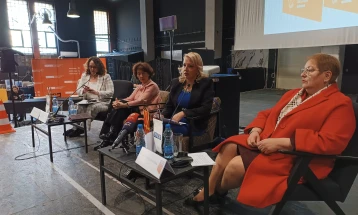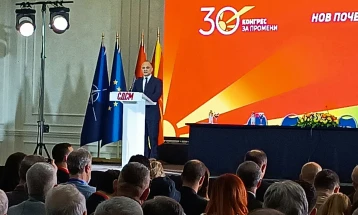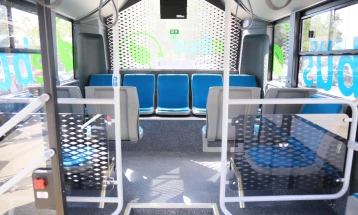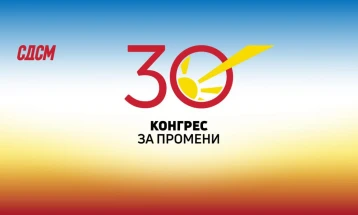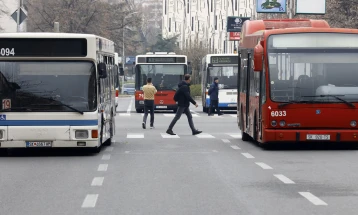Macedonian online buyers spend up to €50, use internet mostly for social media and phone calls
- The Macedonian online buyers, like the Balkan ones, have good internet access, but mainly use it for social media, phone calls and video chats. Their online shopping activity usually involves purchases of up to 50 euros, mainly clothing. However, this is not a regular habit; they shop once or twice every three months, making them a "casual online buyer." Generally, they pay in cash upon delivery and prefer to buy from domestic sellers.

Skopje, 12 November 2024 (MIA) – The Macedonian online buyers, like the Balkan ones, have good internet access, but mainly use it for social media, phone calls and video chats. Their online shopping activity usually involves purchases of up to 50 euros, mainly clothing. However, this is not a regular habit; they shop once or twice every three months, making them a "casual online buyer." Generally, they pay in cash upon delivery and prefer to buy from domestic sellers.
As stated Tuesday by Nina Angelovska Stankov, President of the E-Commerce Association, some of the reasons for these characteristics include insufficient digital skills, low usage of e-banking, lack of card payment habits and a general lack of trust regarding product delivery.

According to Angelovska Stankov, delivery has a major impact on e-commerce. According to the latest survey, which included 40 companies from the Western Balkans, the biggest challenges are the speed of delivery, flexibility, reliability, and the insufficient professionalism of delivery services, all of which significantly affect the online shopping experience for consumers.
The latest data shows that over 86.6% of households in the country have access to the internet, and 88.3% of the population are active internet users.
“The region, compared to Europe, has the lowest level of account holders, payment card holders, and the least use of payment cards. Cash remains the dominant payment method. Today, we will explore how to “untangle” other payment methods that are standard in developed countries, where cash payments are not even offered as an option,” Angelovska Stankov said before the start of the Regional E-Commerce Conference.
The Western Balkan countries have made progress in e-commerce, but despite this growth, they are ranked the lowest when compared to European countries.

“We have made a progress, but we are still far from keeping up with European countries. There is much work to be done. When it comes to e-commerce readiness, we always view digital readiness as prerequisite. In this regard, we are not yet at a satisfactory level, as the region ranks very low in terms of digital skills, and acceleration is needed. Over the past five years, Albania has seen a 370% growth in e-commerce, while Serbia, being the largest market, has the most potential-65% of internet users in Serbia are online buyers, and Macedonia ranks second with 54%,” Angelovska Stankov noted.
In addition to clothing, the Macedonian online buyer also buys electronics, household goods, and more.
“When it comes to electronics, we see differences between the European and Macedonian buyer. For example, Albanians buy more than Europeans, while Montenegrins frequently order food from restaurants, unlike Europeans. As for transactions, which are usually under 50 euros, purchasing power is one of the reasons. Still, some of these transactions are paid in cash upon delivery. In Europe, orders are typically between 100 and 500 euros. Another important factor is how often people shop online; here, online shopping is still not a habit,” she noted.
She also assessed that private postal services have seen significant growth in their operations, but they need to implement more modern technologies to optimize their processes, lower costs and enhance quality. She noted that the shortage of personnel can be overcome by implementing better technology.

“The latest data is encouraging. Over 86.6% of households in the country have access to the internet, and 88.3% of the population are active internet users. These figures place our country in a leading position in the region, while also reflecting the potential for development. It is encouraging to see how our local platforms are already implementing modern technological solutions, from advanced artificial intelligence-based systems and innovative payment solutions to new delivery methods. This demonstrates that we have the capacity to develop solutions that meet modern consumer needs and can advance with global standards,” the Minister for Digital Transformation, Stefan Andonovski, said.
He revealed that in the following period, focus will be on developing a favourable business climate that will encourage entrepreneurship, particularly in the digital field.
“Through ongoing dialogue and cooperation, we will continue to work towards creating a more competitive and dynamic ecosystem that will serve as a driver for economic growth and digital transformation. With a unified vision and coordinated efforts, we can overcome challenges and unlock the full potential of the digital economy in our region to reach the standards of European markets. Our goal is also to focus on facilitating cross-border trade, improving payment systems, and modernizing logistics infrastructure,” Andonovski noted.
The 7th Regional E-Commerce Conference, taking place in Skopje under the theme "E-commerce: Untangling Potential," features over 700 participants from both the country and the region, including representatives from leading companies, international organizations, and academic institutions.
As Angelovska Stankov underlined, the region's potential in e-commerce is now being noticed by international companies that have entered these markets, and there is also a growing presence of regional companies expanding into several countries across the Western Balkans.
Photo/video: MIA
